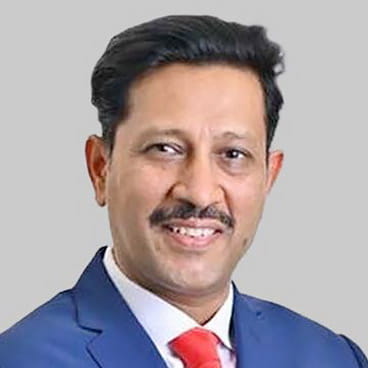Embracing Disruption
Interview with Anand Gupta

Insights on Anand’s thoughts on Indian Equities.
Q: Tell us a little about your personal and professional background before you came to AllianzGI.
I was born and grew up in India, where I studied Commerce at Punjab University and later studied for my chartered accountancy qualifications before earning the CFA charter. My father was a banker, so I was exposed to finance and commerce from a young age. I’ve always taken a keen interest in companies’ business models, and this is something that informed my thinking in the early years and has, in fact, featured throughout my career. Though I no longer live in India and now call Singapore “home,” my connection to India remains extremely strong – I am back there at least every two months.
In terms of my professional career, I’ve spent the last 14 years specialising in Indian equities out of Singapore, while for seven years before that I worked for India’s largest mutual fund firm, based in Mumbai. Prior to that, I gained some initial experience on the sell side at a large global bank in India.
Q: What attracted you to AllianzGI and, two months in, how are you feeling so far?
For me, there were two main pulls. First, the firm’s commitment to the asset class attracted me, especially in terms of its dedication to building a best-in-class India equity franchise. I saw this before I joined the company, and the feeling has only been reinforced through my working relationships with colleagues during the first few months here. Indian equities are my passion, and it is rewarding to be part of AllianzGI’s growing India spirit, where I hope to help our team develop a better understanding and differentiated view on this complex and nuanced market.
The second was the integrity of approach to investing and clients. I subscribe to a bottom-up, active investment philosophy that strives to both protect and grow capital, so I think I fit in well in AllianzGI’s culture. Also, maintaining client value always comes first for me, whether in respect to ESG, client service or other fiduciary aspects, which I feel is a great match with AllianzGI’s high level of client engagement.
Q: Investors’ perspectives on India have recently started to change and the country’s equity markets have become more popular. What do you think has led to this shift?
We’ve certainly reached a tipping point, and India is now too big to ignore. It’s already the world’s fifth largest economy and will rise to third within four years or so. Of course, investors can’t afford to ignore a market with such potential. On top of this, India’s recent growth and development has been phenomenal, with exponential gains in productivity and technology adoption ongoing. For example, India has added 500 million internet users in the last seven years, while the cost of data has dropped by more than 90% at the same time. This has opened up a world of new business models for Indian entrepreneurs.
In addition, we see continuity of India’s strong and stable domestic political mandate and advantageous trading position on the world stage. This means India can look to strengthen its station as a neutral place to do business amid ongoing geopolitical tensions.
Q: This brings us to the longer-term prospects for the Indian economy and specific sectors which are set to stand out. Could you shed some light here?
I think the future looks bright for several reasons. First, India has extremely favourable demographics. It is a young country if we look at the median age of the population, and this provides tailwinds for sectors offering certain products and services, while also encouraging new economic sectors to emerge. Many old economy sectors are enjoying huge boosts in productivity thanks to rapid technology adoption and digitization.
Government reforms are also contributing to this sweet spot, and the resultant economic benefits should last for some time.
In terms of sectors, there really are not any that I would want to fully eliminate at the moment when investing in India or considering doing so. Such is the current dynamism of the Indian economy whereby opportunities are plentiful. However, there are some “sunset” industries facing structural challenges like coal, for example, that we aim to avoid in our approach to finding tomorrow’s winning business models. Inherent in this, a large part of our research effort is targeted at avoiding pitfalls related to weak corporate governance. These pitfalls can arise in any sector, so we need to stay vigilant.

Q: Some investors may be less familiar with the Indian markets. What essential information would you want to share with them?
The key point to stress is that India is the most diversified market among all emerging markets. If you look at the spread between defensives and cyclicals, exporters and importers, or the balance of sector weightings within published indices, India compares much more favourably in terms of diversification than other emerging markets like Brazil, South Korea and Taiwan.
Moreover, the Indian equity market is extremely liquid and is ahead of many European markets in this respect. Small savers in India are increasingly transferring their cash deposits to equity markets, contributing to a stickier and more stable investor base – foreign investors have become a far less important driver of flows in the equity markets.
Finally, as alluded to previously, India has a stable domestic political landscape. Indeed, the political mandate is that of a strong democracy, rivalling not just other emerging markets, but developed markets, as well. The BJP ruling party currently has absolute control over the lower house of parliament and is wielding significant influence in the upper houses, enabling the efficient passage of legal reforms. This stability is underlined by plummeting levels of corruption, which is down by around 95% in recent years by some measures.
Q: Sticking with the political situation, India will be holding general elections in April and May. What are the key issues at stake?
The chances of any sort of political change are extremely low. Analysts give the ruling party around a 90% chance of being reelected, and I would personally put it even higher. In addition, state elections in early December 2023 saw the ruling party secure large majorities, helping to solidify my view.






